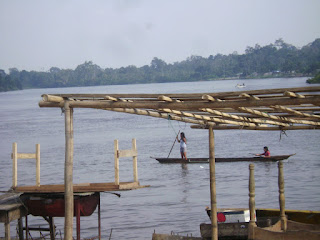Narcomar, to Chamanga 2012
After a wait of half an hour, the bus left El Salto for Chamanga, the last parish before crossing the bridge over the Cojimíes River, which separates the provinces of Manabí and Esmeraldas, which is within the Mache Chindul Reserve.
With ballads by Marco Antonio Solis and the bustle of Argentine boys, who felt euphoric to be so far from their country, exploring these green and tropical landscapes of the South American Pacific, the bus moved along a new highway, with almost no traffic.
Through the window you could see how the mangroves and shrimp farms appeared and disappeared on the side where she was sitting, as well as the sea, while on the other side the pastures, the zebu or brahaman cattle, rose and fell by rounded and small hills.
The story that his father told him came to his memory, that on a day like today in 2005 when in the company of Juan Carlos, a friend of the family, he came to stop the logging, accompanied by policemen and the security cameras. a TV channel. When they reached the Rio Cojimíes bridge, a trailer was parked, with hundreds of wooden planks around it. The policemen and cameramen gave up filming, stopped that, and returned, her father and Juan Carlos stayed in Sálima, the town where he had worked on a malaria investigation years before when there was no paved road that there is now. When he saw the truck with wood again, they asked a policeman from the forest control to stop him. A well-dressed man got out of the truck, who presented his papers. The doctor asked for them, the truck driver showed the policeman a gun at his waist and left calmly, but forgot the permission to transport wood. Her father and Juan Carlos boarded a bus to Chamanga and soon after the bus was crossed by a truck, from which men armed with automatic weapons got out and fired into the air. All the panicked passengers were from a cartel that dealt with drugs and wood. Men armed and dressed in fancy shirts, boots, and cowboy hats got on.
- Who is the doctor? - They asked with their Manabi accent.
"It's me," the doctor answered.
In man he drew his machete from a well-decorated embossed leather sheath, very luxurious, showing the brilliance and edge of that weapon.
-Get down doctor - we have to settle some business with you.
"I'm not getting off this bus, I'm going to fight and if they kill me there will be 40 witnesses," he answered, facing him.
-Do you have the guide to our shipment of wood?
- I got it.
- Please, can you return it to me?
- Here it is.
-And his camera too.
-I do not give them the camera, because for it I can accuse them of theft, I can give them the memory card, where the photos of the truck and the cargo area.
The men took both and left. But his father went to the town of Chamanga to report what happened. That town of Chamanga, he told her that it was a huge and bustling cantina on a hill, beyond a muddy boat dock, with shacks and brothels everywhere. Her mother came years ago, when she went in search of her father to Chamanga, as she was working in the area in a malaria investigation when she arrived in a boat loaded with beer and alone, she was mistaken for a prostitute, who were the only strange women As she arrived at that place, the men from the dock celebrated her arrival with cheers and shouts of welcome that frightened her.
Chamanga was a place where money from shrimp and shrimp fishing drove them crazy when the so-called shrimp fever came in the late 1980s.
Now there was a fever of drug trafficking, with clandestine tracks for airplanes, in Pedernales, narco-submarines, speedboats hidden in the mangroves, or drugs hidden in the shrimp pools.
When crossing the bridge over the Sucio River, the driver told him to get off, that the town of Puerto Nuevo is one kilometer away, following a dirt road between pastures with cattle.
Máxima got out, continued along that path where mosquitoes were abundant until she reached a soccer field, which had houses around it, on the north bank of the river. That place had been the most important port after San Gregorio, for him the indigenous Chachi's and the peasants who live in the Mache Chindul Reserve, traveled to San Salvador, the indigenous commune, upriver, in that enormous reserve of 250,000 hectares.
A child took her to the home of the health promoters, where she was waiting, peasants, most of them old, whom her father had trained in the 70s and 80s.
When the peasants saw her, they welcomed her with hugs, with joy and invited her to sit at her table, where they had prepared a welcome meal. Before starting to eat, they read the Bible, as the liberation theology priests had taught them.





Comentarios
Publicar un comentario